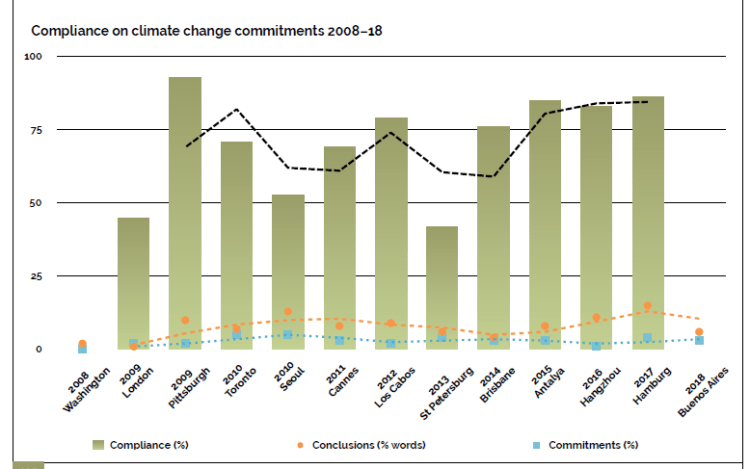Challenge
Proposal
The G20 has governed climate change since its first summit in 2008, and will do so again at its Osaka Summit in June. The G20’s climate change leadership matters. The group includes the countries that bear both the historic and projected responsibility for the impacts of their emissions, which account for at least 74% of the global total. Yet although G20 members have the technological and financial capacity to respond, the 2018 United Nations Emissions Gap Report states that the G20 members are off track to meet their emissions reduction targets.
Moreover, not all G20 members have ratified the Paris Agreement. With only 12 years left to transform the economy to avoid the worst impacts of climate change, the G20 must increase its ambition and its compliance to meet the scale of the climate change crisis.
Conclusions
The G20 first acknowledged that climate change was a serious problem at its 2008 Washington Summit, dedicating 64 words to the subject in its communiqué. It dedicated another 64 words at its next summit, in London in 2009. Attention to climate change then grew, reaching 2,018 words at the 2010 Seoul Summit. Since then, with two exceptions, the climate change word count never fell below 1,000 words. These communiqué conclusions centred on green growth and a green financial recovery from the 2008 US-led global financial crisis, support for the UN Framework Convention on Climate Change and its negotiating process, and the mobilisation of climate finance.
Commitments
The G20 made 78 collective, politically binding, future-oriented climate change commitments between 2008 and 2018. The first three were made at the 2009 London Summit. It again made three each at the 2009 Pittsburgh and 2010 Toronto summits, and eight each at Seoul in 2010 and Cannes in 2011. Then came a dip to five at Los Cabos in 2012, a rise to 11 at St Petersburg in 2013, and another dip to seven at Brisbane in 2014, falling further to five at Antalya in 2015. Then, at Hangzhou in 2016, came a historic low of two commitments, followed by a historic high of 22 at Hamburg in 2017. At Buenos Aires in 2018, the G20 made three commitments.
Compliance
These commitments matter only if they are complied with once the leaders go home after the summit ends. The 29 climate change commitments that have been assessed by the G20 Research Group average compliance of 69%. There has been a slight if not steady rise in compliance from 2009 to 2018.
The highest compliance came on the subject of adaptation with 82%, followed by support for the UN climate regime with 77%, green growth with 67%, climate finance with 56% and the ozone layer with 48%.
By member, Germany has the highest compliance at 92%. Following closely are the United Kingdom with 90%, then the European Union, France and Australia at or above 85%, and Canada and Korea with 81% each. In the middle are Mexico with 78%, Japan with 74%, China with 73%, Italy and Indonesia with 66% each, and the United States and India with 62% each. At the bottom are Argentina with 58%, South Africa with 56%, Russia with 45%, Turkey with 35% and Saudi Arabia with 30%.

Corrections
The G20 does comply with its climate change commitments, but there is a substantial, urgent need for improvement. It can raise its compliance by employing low-cost accountability measures that are in the leaders’ direct control. Research shows that holding a same-subject ministerial meeting ahead of the leaders’ summit leads to both a higher number of commitments on that subject and higher compliance with them.
Moreover, a higher number of commitments is linked to higher compliance. The top six highest complying summits generated average compliance of 84% and 42 commitments. The bottom five complying summits had average compliance of only 56% and 33 commitments.
Also relevant are catalysts – words or phrases embedded into the text of a commitment that help or hurt compliance. The catalyst of a multi-year timetable has been found to be a strong inhibitor, and the catalyst of a core international organisation has been found to be an enhancer. The G20 can therefore improve its climate change compliance by:
- Holding regular pre-summit environment ministers’ meetings, of which none have been held before 2019;
- Making more commitments on climate change;
- Avoiding setting multi-year timetables in the absence of shorter and more immediate deadlines, to ensure the longer-term target is met; and
- Strengthening ambition and support for the UNFCCC regime as the core international institution on climate change, which includes encouraging all members to ratify the Paris Agreement.
The views and opinions expressed in this article are those of the authors and do not necessarily reflect the views of the Global Solutions Initiative. This article was originally published in G20 Japan: The 2019 Osaka Summit by GT Media Group and the G20 Research Group, 2019. View the original article.








